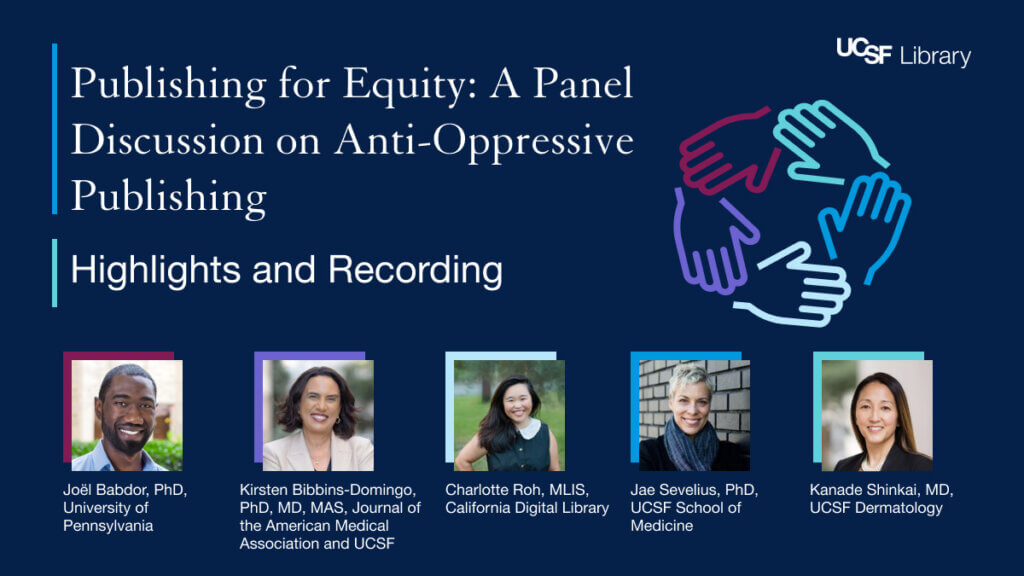The UCSF Library hosted the virtual panel, Publishing for Equity: A Panel Discussion on Anti-Oppressive Publishing, on July 13, 2023. Faculty members Dr. Kirsten Bibbins-Domingo, Dr. Joel Babdor, Dr. Jae Sevelius, and publications expert Charlotte Roh shared their perspectives on the topic of anti-oppressive publishing and held an engaging discussion moderated by Dr. Kanade Shinkai.
Structural inequities that exist in the academic and research spheres can be exacerbated in the publishing environment. The academic publishing systems currently in place are reinforced by those who have historically benefited from these systems. Anti-oppressive publishing recognizes barriers to publishing for historically marginalized individuals and is an attempt to mitigate the effects of discrimination, bias, and inequities in scholarly publishing.
Highlights from the webinar
Four themes emerged from the insights shared by the distinguished panelists.
First is how journals and journal editors serve as gatekeepers. Journal editors decide which written works are accepted for publication, thus influencing which research receives readers’ attention. Editorial boards can and must do all they can to ensure fair and equitable opportunities for all authors to publish, scholars to review, and audiences to read their journals. In addition, mentoring early career researchers and creating a publishing system that addresses their needs is essential.
Second, peer review contributes to systemic inequities. There is no single or simple solution for eliminating reviewer bias. Models such as anonymizing the authors’ and reviewers’ identities, open peer review, and community review can help. However, all systems of inequities, including the reviewer’s career stage, need to be examined. Furthermore, we have to acknowledge the labor of conducting peer review, which is enormous yet uncompensated.
Third, social media platforms are critical for networking and supporting minoritized communities. For example, members of the immunology community like those in Dr. Babdor’s Black in Immuno network can create their own visibility on social media rather than waiting for gatekeepers to recognize and amplify their work. Social media services are also increasingly important for all researchers disseminating their scholarly work. Scholars need to learn how to communicate via these platforms and how to avoid the pitfalls.
Finally authors, peer reviewers, and editors can take meaningful steps to practice anti-oppressive publishing. Examples include using inclusive language in scholarly writing, giving credit equitably in reference lists, and challenging how past studies, methods, and frameworks perpetuate stereotypes or harmful power dynamics. Editorial boards and reviewer pools should also be diversified to reflect the field of research they serve.
Recording and webinar slides
Learn more via the discussion recording and slides shared by the panelists.
For additional resources on this topic, visit the Diversity, Equity, and Inclusion in Scholarly Communication Guide on the University of California Office of Scholarly Communication website.

